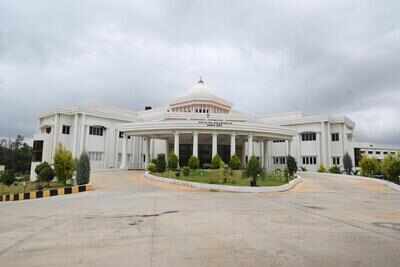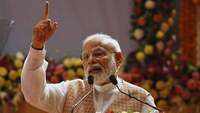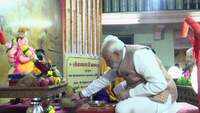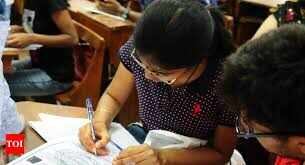
MYSURU: Pointing to the cloud of uncertainty still hovering over the future of the thousands of students who enrolled in the programmes that Karnataka State Open University (KSOU) offered without obtaining prior approval from the competent authorities, Mysuru MP Pratap Simha on Friday laid the blame for this mess at the feet of the varsity’s former vice-chancellors (VCs).
“If one has to blame anybody for the derecognition of KSOU’s courses, it is the previous VCs. The KSOU management committed a mistake by starting programmes although the University Grants Commission (UGC) had not approved them. Many affected students call me to express the problems they are facing following the derecognition of several programmes,” said Simha, who inaugurated a two-day All India Open Universities’ Vice-Chancellors’ Conference on ‘Role of Open Universities in The 21st Century: Issues and Challenges’ at KSOU.
Defending the UGC’s actions, Simha said that the overseeing body did not intend to plunge the careers of the students of KSOU students in uncertainty.
Simha appealed to the varsity’s present VC S Prof S Vidyashankar to take measures to ensure a bright future for the varsity and its students, by rectifying the mistakes made by some of his predecessors, and setting the university on the right track. “I do not want to see that the KSOU is in the news only for all the wrong reasons, as was the case earlier,” said the MP.
‘Dual-mode universities a cause for concern’
Meanwhile, Prof Vidyashankar lamented the poor enrolment ratio to both undergraduate and postgraduate programmes in all universities across the country. Pointing that the percentage of enrolment to higher education courses across the board in India was significantly below the global average, Vidyashankar said, “The draft of the latest National Education Policy (NEP) states that the government will make a concerted effort to push the percentage up. And it is in keeping with this objective that dual-mode universities have been directed to focus on both open distance learning, and online programmes. This is a matter of concern for us, since such a policy threatens the very survival of dedicated open universities.”
The KSOU VC opined that declaring the state-run open university the only competent varsity to offer correspondence programmes in each respective state would help these varsities remain relevant in the long run.
‘Open varsities must contemplate offering online programmes’
Joint secretary of the UGC, New Delhi Avichal Kapur called on the management of open varsities to mull over the possibility of offering online courses. “Open varsities can lead the change by offering full-fledged online programmes. The UGC’s chief objective is to improve the overall quality of education in the country, and we are leaving no stone unturned to meet our targets,” said Kapur.
Adding that the UGC did not discriminate between dual-mode and open varsities, Kapur said, “We have recognised 113 varsities, and as many as 1,488 programmes. Of these, 15 are open universities, and the collective enrolment in these varsities comes up to 11 lakh.”
Conference schedule – Saturday
*Disability studies, and inclusion in open universities
*University Grants Commission’s mechanism for recognition
*Open universities and National Assessment and Accreditation Council (NAAC) – The Rough Road
*Status of distance education in 2035
*New policy and distance education
“If one has to blame anybody for the derecognition of KSOU’s courses, it is the previous VCs. The KSOU management committed a mistake by starting programmes although the University Grants Commission (UGC) had not approved them. Many affected students call me to express the problems they are facing following the derecognition of several programmes,” said Simha, who inaugurated a two-day All India Open Universities’ Vice-Chancellors’ Conference on ‘Role of Open Universities in The 21st Century: Issues and Challenges’ at KSOU.
Defending the UGC’s actions, Simha said that the overseeing body did not intend to plunge the careers of the students of KSOU students in uncertainty.
Simha appealed to the varsity’s present VC S Prof S Vidyashankar to take measures to ensure a bright future for the varsity and its students, by rectifying the mistakes made by some of his predecessors, and setting the university on the right track. “I do not want to see that the KSOU is in the news only for all the wrong reasons, as was the case earlier,” said the MP.
‘Dual-mode universities a cause for concern’
Meanwhile, Prof Vidyashankar lamented the poor enrolment ratio to both undergraduate and postgraduate programmes in all universities across the country. Pointing that the percentage of enrolment to higher education courses across the board in India was significantly below the global average, Vidyashankar said, “The draft of the latest National Education Policy (NEP) states that the government will make a concerted effort to push the percentage up. And it is in keeping with this objective that dual-mode universities have been directed to focus on both open distance learning, and online programmes. This is a matter of concern for us, since such a policy threatens the very survival of dedicated open universities.”
The KSOU VC opined that declaring the state-run open university the only competent varsity to offer correspondence programmes in each respective state would help these varsities remain relevant in the long run.
‘Open varsities must contemplate offering online programmes’
Joint secretary of the UGC, New Delhi Avichal Kapur called on the management of open varsities to mull over the possibility of offering online courses. “Open varsities can lead the change by offering full-fledged online programmes. The UGC’s chief objective is to improve the overall quality of education in the country, and we are leaving no stone unturned to meet our targets,” said Kapur.
Adding that the UGC did not discriminate between dual-mode and open varsities, Kapur said, “We have recognised 113 varsities, and as many as 1,488 programmes. Of these, 15 are open universities, and the collective enrolment in these varsities comes up to 11 lakh.”
Conference schedule – Saturday
*Disability studies, and inclusion in open universities
*University Grants Commission’s mechanism for recognition
*Open universities and National Assessment and Accreditation Council (NAAC) – The Rough Road
*Status of distance education in 2035
*New policy and distance education
Trending Topics
LATEST VIDEOS
More from TOI
Navbharat Times
Featured Today in Travel
Quick Links
Lok Sabha Election Schedule 2019Lok Sabha Election NewsDelhi Capitals teamMI team 2019Rajasthan Royals 2019RCB team 2019Maharashtra Lok Sabha ConstituenciesBJP Candidate ListBJP List 2019 TamilnaduShiv Sena List 2019AP BJP List 2019Mamata BanerjeeBJP List 2019 MaharashtraPriyanka GandhiBJP List 2019 KarnatakaAMMK Candidate List 2019BJP List 2019 WBLok Sabha Elections in Tamil NaduBSP List 2019 UPNews in TamilLok Sabha Poll 2019Satta Matka 2018PM ModiMahagathbandhanNagpur BJP Candidate ListChandrababu NaiduTamil Nadu ElectionsUrmila MatondkarNews in TeluguMadras High CourtTejashwi YadavArvind KejriwalTejasvi SuryaPawan KalyanArvind KejriwalYogi AdityanathJaya PradaSatta King 2019Srinagar encounter
Get the app







